Homes away from homes
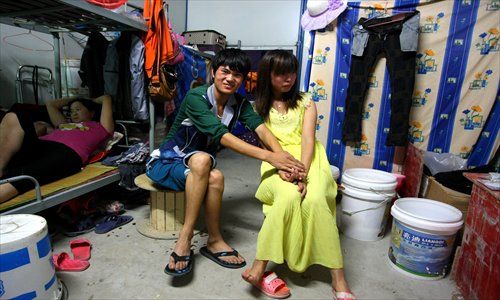
Wu Jianguo and his shy wife sit in the accomodation which they share with three other couples. Photo: Yang Hui/GT
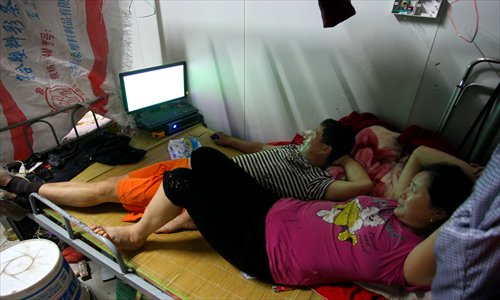
Henan native Ding, now a small labor contractor, plays computer games on a narrow bed while his wife watches closely.Photo: Yang Hui/GT
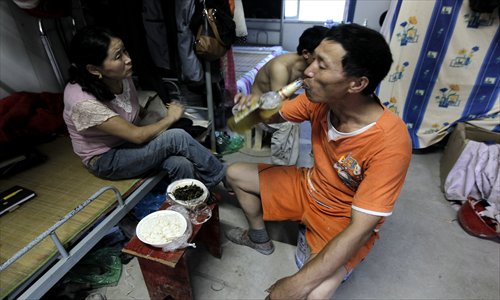
A bottle of beer, a bowl of rice and some kelp make up Ding's evening meal. Photo: Yang Hui/GT
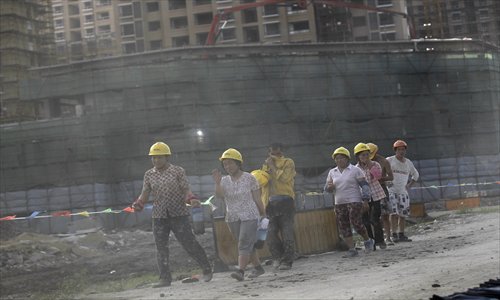
Husbands and wives on their way back to their accommodation after a hard day on the dusty construction site. Photo: Yang Hui/GT
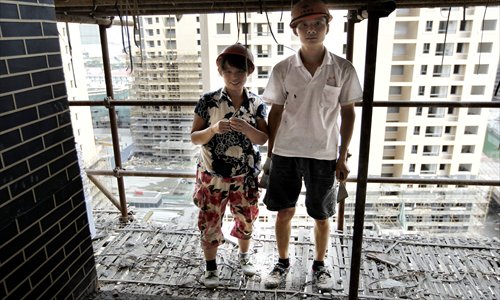
With their tools in hand, a couple pose for the Global Times photographer in front of a nearly-finished apartment building. Photo: Yang Hui/GT
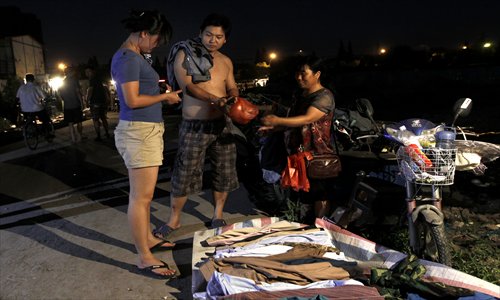
Zhang's wife buys secondhand clothes from a stall. Photo: Yang Hui/GT
Many of these "couples" have moved away from their hometowns and now live and work together in cities. However, they never talk to each other's family or discuss family affairs. Usually one of them is married to another person who lives far away. They are called "temporary husbands and wives" and keep their special relationships secrets to their original families. These temporary couples are a growing phenomenon among China's migrant workers.
More than 200 million Chinese have left life on the land to come to work in cities. But for many complicated reasons like expensive housing and hukou (household registration), which can mean living without welfare assistance, education or health insurance, many of these migrants have had to leave their husbands, wives and families behind. Alone in the city, they form relationships with other lonely people and often find that they soon have another family around them.
These extramarital relationships have been common in Shanghai and Zhejiang Province which have attracted large groups of migrant workers, according to a Xinhua news report. A 2012 survey conducted by a recruitment website targeted at migrant workers indicated that most migrant workers in big cities experience loneliness. This survey interviewed more than 18,000 migrant workers and 62 percent of the married subjects said their husbands or wives were living apart from them back home. About 25 percent said they could meet their spouses once every six months but 13 percent said it was difficult to see their spouses even once a year. Nearly 30 percent of those interviewed said they barely communicated with their husbands or wives back home.
To help with these problems, some major construction projects in the city have begun to provide apartments for migrant workers so that husbands and wives can work and live together. On the construction site of a low-cost housing project in Nanxiang town, Jiading district, four couples are now living together for free in special accommodation.
Wu Qiaoyun, from Guizhou Province, came to Shanghai a year ago. When his wife came to visit him earlier this month, she decided to stay. "Given the zero rent and the comparatively low daily expenditure, we could manage our life here with my monthly income of a bit over 4,000 yuan ($652). But I won't ask my wife to work on the dusty construction site," the 28-year-old told the Global Times.
Unlike these newcomers, Ding and his wife arrived in the city nearly 10 years ago. The Henan natives were originally earning only 30 yuan a day. But now the husband has become a small labor contractor. "I couldn't earn a penny for the first half of this year because the project payment was delayed yet I had to keep paying the workers on time every month," the 44-year-old said.
To help them survive, Ding's wife is now working on the construction site, earning around 2,000 yuan a month. As well their 18-year-old son has also been working on site since he left school when he was 15. Although the living space is limited, the couple enjoy their spare time playing computer games together on their narrow bed.
Also from Henan Province are Zhang and his wife. They have been living in the city for five years and together they earn around 6,000 yuan a month. Although Zhang's wife loves shopping, at present she can only afford to buy secondhand clothes from street stalls, usually paying no more than 20 yuan.